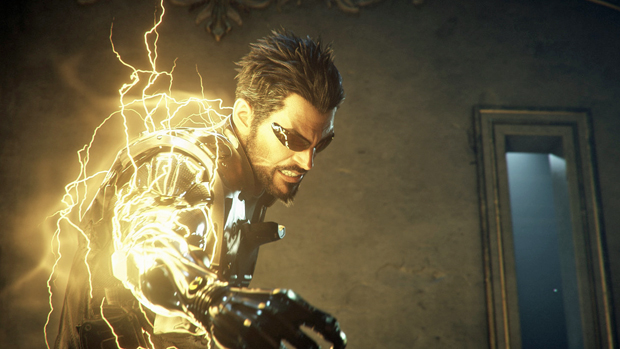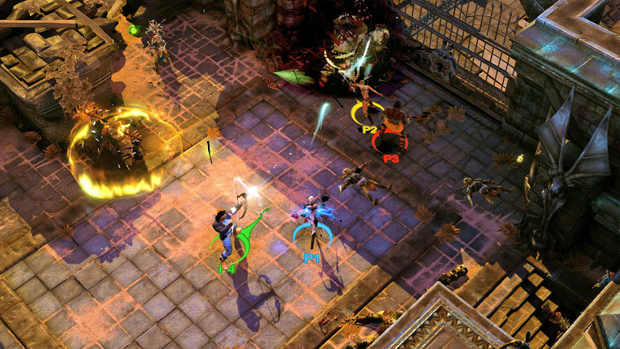January’s PS+ Titles Involve Transhumans, Dark Knights, Psycho-Passes
Starting the year off right with their PlayStation Plus free titles, Sony has decided to explore the grimness of dystopias and distorted fantasy realms. There’s variety in the types of games involved, including three different “interactive adventure”-style experiences that are all slightly different, which span from quirky fantasy environments and modern comic-book settings to futuristic metropolises. One AAA stealth title has been included, another featuring the Caped Crusader himself, and a series of indies that span from a known anime property to an entirely new survival-horror game rendered in beautiful pixel art visuals. The critical reception to them varies, naturally, but there’s a little bit for most adult-aged gamers in this batch of titles. Let’s take a look at the first PS+ games of 2018.

Eidos
PS4
Deus Ex: Mankind Divided
When Eidos brought the Deus Ex series into the modern era with the prequel Human Revolution, it resulted in a versatile first-person stealth experience with a noteworthy role-playing streak. From the perspective of Adam Jenson, it calls back to the original with its cyberpunk atmosphere while tapping into a new attitude with its dialogue and approaches to complicated scenarios, engaging themes of transhumanism and the dystopic control of corporations in the process. Thus, the sequel, Mankind Divided, had relatively large shoes to fill, while also continuing a complex story in which the conflict between augmented and nonaugmented humans has strengthened. Taking feedback from Human Revolution into account, Eidos ensured that Mankind Divided could be finished through both lethal and non-lethal approaches to the level design, skill upgrades, and general role-playing, while continuing the first game’s successes in control precision and upgrade versatility into a reputable follow-up.
Batman: The Telltale Series
There’s a mantra of sorts that has taken off in popular culture: “Always be yourself … unless you can be Batman. Then always be Batman.” It’s this line of thinking that Telltale Games capitalizes on with their spin on the Dark Knight, an interesting fit for the interactive adventure game-makers considering the general lack of action involved with their games. What Telltale provides in their first season with the superhero is about as action-oriented as one can expect while staying true to their design choices, focused more on the psyche and duality of the hero through choices and dialogue than trying to be something that the developers aren’t comfortable with. With Troy Baker in the role as Batman — the first time someone has played (at different times) both the Caped Crusader and his nemesis, The Joker — Telltale spins a story of political corruption and malignant revolution in the city of Gotham, limited only by the developer’s recurring stability issues and gamers’ expectations of what a Batman game entails.

Keen Games
PS3
Sacred 3
A couple of years went by at the beginning of last generation’s console life cycle where gamers had few options in the hack-‘n-slash RPG arena, leaving those itching for a Diablo or Baldur’s Gate: Dark Alliance style of game constantly hunting and patiently waiting for that kind of experience. Sacred 2 swooped in a half-decade after the original’s release and filled that void on consoles, mostly due to a lack of competition in sight, which merited enough attention to lead to the development of Sacred 3. Unfortunately, a few key things hampered the third’s success: 1) Diablo 3 had arrived shortly beforehand, removing its “substitute” appeal; and 2) Sacred 3’s approach to dungeon crawling involved stripping away the RPG elements, notably the collection of loot. Emphasis is placed on the “action” side of this action-RPG, descending into the dungeon-crawler subgenre with marginal co-op appeal and against enough fantasy-RPG opposition to make it look scrawny in comparison.
The Book of Unwritten Tales 2
Console gamers drawn to The Book of Unwritten Tales 2 can be forgiven for being unaware of King Art Games’ series of lighthearted point-and-click adventures, since the original installment never made its way to last-gen’s machines. Much like other franchises, that doesn’t matter as much in the realm of gaming, since installments are often designed to catch players up and stand alone. This sequel picks up a few years after the original, incorporating the same characters but embarking on a new storyline involving an evil magic presence spreading across the land, one that’s turning majestic things into something … cute. In the vein of Sierra’s classic whimsical adventures, The Book of Unwritten Tales 2 taps into overt humor and spoofing whilst writing its tale, though critics and players weren’t convinced by the exaggeration of its conversations and the archaic trappings of its gameplay.

5pb
PS Vita
Psycho-Pass: Mandatory Happiness
The anime property Psycho-Pass lingers in a middle-ground in terms of popularity, not having the name recognition of the likes of Tokyo Ghoul or One Piece yet still possessing a loyal, enthusiastic base of fans. Visual novel Mandatory Happiness bases itself within the original anime series, set in a dystopian environment that hinges on a technology similar to identifying “pre-crimes” in Minority Report, where people are preemptively hunted down for crimes they’ve yet to commit. Critics are quick to point out the positive quality of the writing and the faithfulness of the visual novel to the tone and intentions of the original fiction, though the graphical flow of the storytelling earns some disapproval.
Uncanny Valley
Wrapping up this month’s freebies is Uncanny Valley, from Cowardly Creations, an indie survival horror game that touts a “consequence system”. While telling the story of Tom on his first day working as a security guard at a mysterious building, decisions are made by the player that impact the paths taken of the story, which continues regardless of how badly the decisions impact the world around Tom. Old-school pixel graphics give Uncanny Valley’s atmosphere a distinct artistic flavor, making Tom’s exploration of the building all the more eerie. Those who’ve played the game have noted that the controls and the visual style work against the game’s encouragement to repeatedly play through it for the numerous story permutations, though.












